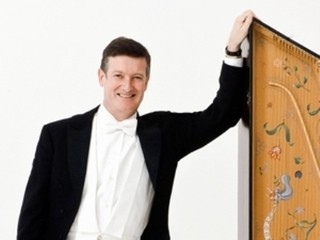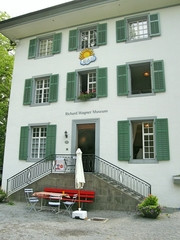|
Back
Hough to Master a Dvorák Concerto New York
Isaac Stern Auditorium, Carnegie Hall
01/15/2015 -
Richard Wagner: Siegfried-Idyll
Antonín Dvorák: Piano Concerto in G Minor, Opus 33
Josef Haydn: Symphony No. 104 in D Major (“London”)
Stephen Hough (Pianist)
Orchestra of St. Luke’s, Harry Bicket (Conductor)

S. Hough (© www.stephenhough.com)
What had once been a rarity in New York has now become almost a staple. Antonín Dvorák’s Piano Concerto, almost never played until Rudolf Firkusný took up the challenge several decades ago, was performed here only last month, with Martin Helmchen, the young German virtuoso doing a bang-up fireworks display with the New York Philharmonic.
Last night, we heard an entirely different Piano Concerto. And while St. Luke’s Orchestra doesn’t match the color of the Phil under Christoph von Dohnányi, Martin Helmchen gave us an Olympic speed-runner, while Stephen Hough’s Dvorák possessed in turn elegance, ebullience and a far greater appreciation for Dvorák’s unusual twists and turns.
Even more, this was a performance which, while lacking Helmchen’s breathlessness, had a relaxed breathing period, from the very first entry, where Mr. Hough lifted those opening thirds so carefully, yet with such lovely gradation. And in the second subject, even more, Mr. Hough and Mr. Bicket allowed the tempo to fall back, to give almost a Chopin-style retardation. The rest of this long movement is more episodic than organic, but Mr. Hough allowed each episode, no matter how difficult (including the coda) to play at its own tempo.
Not even Mr. Helmchen could destroy the second movement, and Mr. Hough allowed the conductor to set his own sustained pace. As for the finale, this was virtuosity in typical 19th Century style, but Stephen Hough rarely allowed it to become a showpiece. The Slavonic dances were playful, the shifts in keys were inspired, and the entire work displayed more than a great pianist at work. It showed equally how Dvorák had written perhaps the most underestimated concerto of his time.

H. Bicket (© Orchestra of St. Luke’s)
Stephen Hough is known as an eclectic musician, writer and painter. But last night was certainly the first time that he resurrected a dying organism. Conductor Harry Bicket, is noted for his 18th Century expertise, so it was no surprise that the opening work, Wagner’s Siegfried-Idyll was so lackadaisical. After all, this was a birthday gift to his wife, and the music, while not exactly festive, obviously did have a lilting melody, a sense that this was a celebration.

”Tribschen” (© Coco T. Dog)
It was written in “Tribschen”, Wagner’s Lucerne house, which, though relatively small, does look upon some verdant meadows. With the morning sun coming through the East door, with a chamber group sitting on the staircase adjacent to the door, it must have been a light, even merry occasion.
St. Luke’s didn’t live up to that merriment. A moribund tempo, even in more lyrical measures, some fairly ragged playing in the horns and winds, and a finish signified that this was an idle Siegfried, that the St. Luke’s orchestra was a dormant beauty which needed sharp impetus to get some life.
Thus Stephen Hough, from his first notes, gave the Prince Charming kiss to the orchestra. From here, they brightened up, and retained their usual spirits until the last work.
Which was Haydn’s last symphony, the “London” Symphony for which Londoner Bicket let out most of the stops. It is doubtful if Haydn had such a large orchestra in England, but so gorgeous is the music that its “inauthentic” volume was hardly a liability.
The first and last movements were actually exhilarating, with booming timpani, blaring trumpets, and some fine strings. Mr. Bicket took the second movement at good moving pace, and while I personally enjoy it slower than Haydn’s Andante, to get the full measure of the near-tragedy, St. Luke’s was quite satisfactory.
Of course Haydn, freed from his provincial Hungarian orchestra, relished the London players, so never bothered about an ordinary minuet. The third movement was in minuet time, but the music was rustic, lively, and always surprising in tempo. Mr. Bicket never called attention to the irregular phrasing, and perhaps that was correct. Haydn had his jokes and surprises, though elation was the commanding spirit. Harry Bicket presented here an authentically high-spirited performance.
Harry Rolnick
|